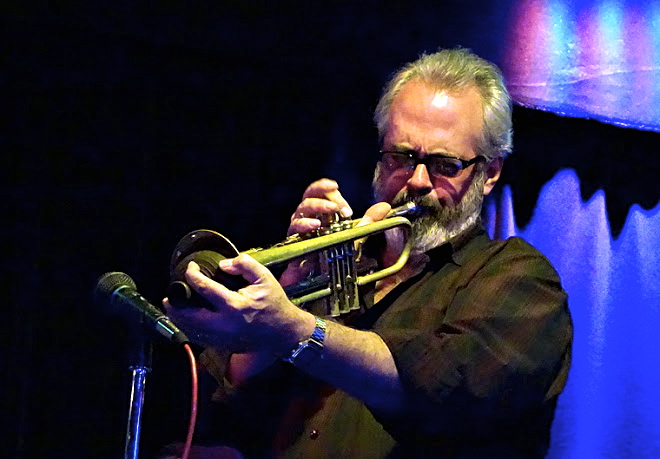Jazz trumpeter Brigham Phillips is extremely grateful to be surrounded by talented musicians in Toronto. “[As Canadians] we don’t often celebrate our own as much as we should, until they go to the states and get big,” says Phillips. “There is no question that there are world-class musicians here in Canada, concentrated in Toronto; I feel very lucky I get to work with and hang out with the Rob McConnells of this world … I’m not going to be moving anytime soon.”
Phillips has himself led a long and successful career as a Canadian brass musician. He’s the leader of the Brigham Phillips Big Band; musical director and keyboardist for international artist John McDermott of Local 1000 (nongeographical); as well as an arranger, composer, and educator. Besides the trumpet, Phillips plays piano and trombone, and sings. A high point in his career was in 2002, when his band was nominated for a Juno Award for Best Traditional Jazz Album and also won the National Jazz Award.
Interest in music started early for Phillips, who remembers strumming the ukulele around beach bonfires, while eating lobster when his family vacationed to Prince Edward Island. Phillips credits those family singalongs for teaching him the fundamentals of music, like how to harmonize. “I could just sing and make stuff up as I went along,” says Phillips. His parents weren’t professionally trained, but his dad, a doctor, played the guitar and sang in church choirs. His mom, a homemaker, played the piano.
Phillips began music lessons when he was in second grade. The start was a bit rocky. Phillips recalls having his knuckles rapped with a ruler by a nun when he messed up an exercise. One night, while his parents were out to dinner, they overheard a piano player performing at the restaurant and convinced him to teach their son. “He taught me how to read music and to play songs like ‘Moon River,’” says Phillips. “He also encouraged me to play by ear. Then in grade seven, I picked up the trumpet for school band, and away we go.”
In high school, Phillips no longer took music classes and focused on playing in a band. He began playing professionally at age 16, much to the chagrin of his parents. “All the rest of the guys in the horn section were 24 years old, and there were three of us who were 16,” says Phillips. “It was quite an education playing university dances and clubs until three in the morning. My parents weren’t really thrilled, but to their credit, since I kept up my marks in school, they allowed me to continue.”
Though he continued to love music and wanted to play, as a young adult, he doubted he could make a living as a full-time musician. Phillips went to college in Halifax to study biology and become a doctor like his father. In his second year at school, he met a musician from Nova Scotia, who had worked in New York City, and now ran the university jazz band. After a rehearsal, the musician asked Phillips why he wanted to be a doctor and not a musician. “I said, ‘I can’ t make a living as a musician,’ and he said, ‘Bull. If you put your nose to the grindstone and get yourself in gear, you’ve got what it takes to make a living in music. Think about it.’”
After finishing up his degree, Phillips stuck around Halifax for one more year playing gigs and then decided to move to the heart of Canada’s music scene, Toronto. “I was a big fish in a small pond in Halifax. Toronto is Canada’s equivalent of New York,” he explains. “I moved in 1982 and have been here ever since, no regrets.”
Phillips plays a variety of musical styles—jazz, blues, big band and dance music, pop, Dixieland, show music, and the list goes on. Throughout his career, he’s mixed things up by playing a wide assortment of gigs, from entertaining Canadian troops in Cyprus and Israel, to playing with The Drifters in Japan. He even played a “castle warming” party in Scotland last fall. “This guy bought a castle and invited 20 friends and family for a party,” says Phillips. “I freelance around doing weddings, even shows like The Lion King and Mamma Mia! I like being a sub, so I can have the variety. That’s what I thrive on.”

